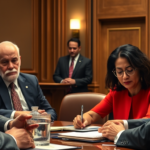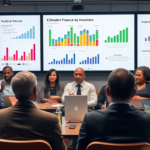Diverse Voices in Cancer Research: The Role of Immigration and Global Collaboration
The Cancer Letter Podcast recently hosted a compelling discussion with Dr. Ruben Mesa and Dr. Kunle Odunsi, who highlighted the critical role of immigration and diversity in advancing cancer research. Their conversation illuminated how diverse perspectives strengthen the scientific community and underscored challenges posed by changing immigration policies that could impede future discoveries.
The Benefits of a Diverse Research Community
Both directors emphasized the invaluable contributions that international professionals bring to the field of oncology. Dr. Mesa, president of Advocate Health Cancer National Service Line, reflected on his Cuban refugee heritage and the enriching impact of diverse experiences within medical research. He noted, “This has always made our environment stronger, not weaker.”
Dr. Odunsi, director of the University of Chicago Medicine Comprehensive Cancer Center, shared his journey from Nigeria to Yale, illustrating the benefits of welcoming international talent. His experience underscores how diverse backgrounds innovate and elevate academic and clinical environments. As research becomes increasingly global, integrating various perspectives and expertise is crucial for breakthroughs in cancer treatment and care.
The Challenges of Changing Immigration Policies
Despite the clear benefits, Drs. Mesa and Odunsi voiced concerns over federal immigration policies, such as the increased fees for H-1B visas. These fees could deter international talent, potentially stalling progress in fields like oncology where global collaboration is vital. Dr. Mesa expressed worry about the broader implications of these restrictions, stating, “It makes us less competitive as a medical community, and our communities will benefit less from that energy and expertise.”
Such policies threaten not only to limit the immediate workforce but could also impact future generations of scientists. The directors warned that restrictive immigration policies might discourage bright minds worldwide from considering careers in the U.S., leading to a loss of talent essential for the continuity of biomedical research.
Local Impact and Community Perspectives
For communities within the United States, especially those in regions heavily reliant on immigrant contributions, these policy changes could have tangible effects. In cities like Chicago and regions such as the Rio Grande Valley, diverse populations have historically driven innovation and cultural enrichment within research institutions and beyond.
Local leaders and residents recognize the potential consequences. Maria Ortiz, a community advocate in Chicago, sees these policies as a barrier to necessary growth. “Our diversity is our strength, and we need to ensure our policies reflect that reality,” Ortiz stated. Such voices highlight the community interest in maintaining open access to international talent and ideas, vital for local and national advancement.
Navigating Financial and Research Constraints
Beyond immigration issues, the conversation also addressed financial pressures from declining federal support for cancer research. Budgetary constraints compound the challenge of recruiting and retaining top faculty and trainees, crucial for sustaining innovation and mentorship in the field. This financial strain calls for exploring alternative funding strategies, as suggested by Dr. Odunsi, who advocates leveraging academic institutions’ intellectual output for revenue.
These constraints intersect with the rising costs of healthcare, impacting access to cancer services and leading to financial toxicity even among insured patients. Addressing these interconnected challenges requires a concerted effort from various stakeholders to ensure sustainable funding and access to cutting-edge treatments for all patients.
Future Implications and Opportunities for Action
Despite the hurdles, Drs. Mesa and Odunsi remain optimistic about the future. They encourage continued advocacy for sustained research funding, drawing on the historical success of the National Cancer Institute’s cancer centers program as evidence of the profound impact that well-supported cancer research can achieve.
The community can play a pivotal role by engaging with local representatives and advocating for policies that foster a welcoming and supportive environment for all researchers. Collaborative efforts between institutions and industries may also provide new funding avenues, ensuring the vitality and progress of cancer research despite federal challenges.
As this issue evolves, residents, local leaders, and national policymakers alike will need to navigate these complexities, emphasizing the community interest in maintaining a robust, inclusive, and innovative research environment. The story of immigration and diversity in cancer research continues to unfold, with the potential to set the stage for transformative discoveries and improved patient outcomes worldwide.
For further information or to get involved in supporting cancer research efforts, community members can connect with local cancer centers or advocacy organizations. Engaging in public forums and staying informed about policy developments are crucial steps in preserving a dynamic and inclusive research landscape that benefits all.







